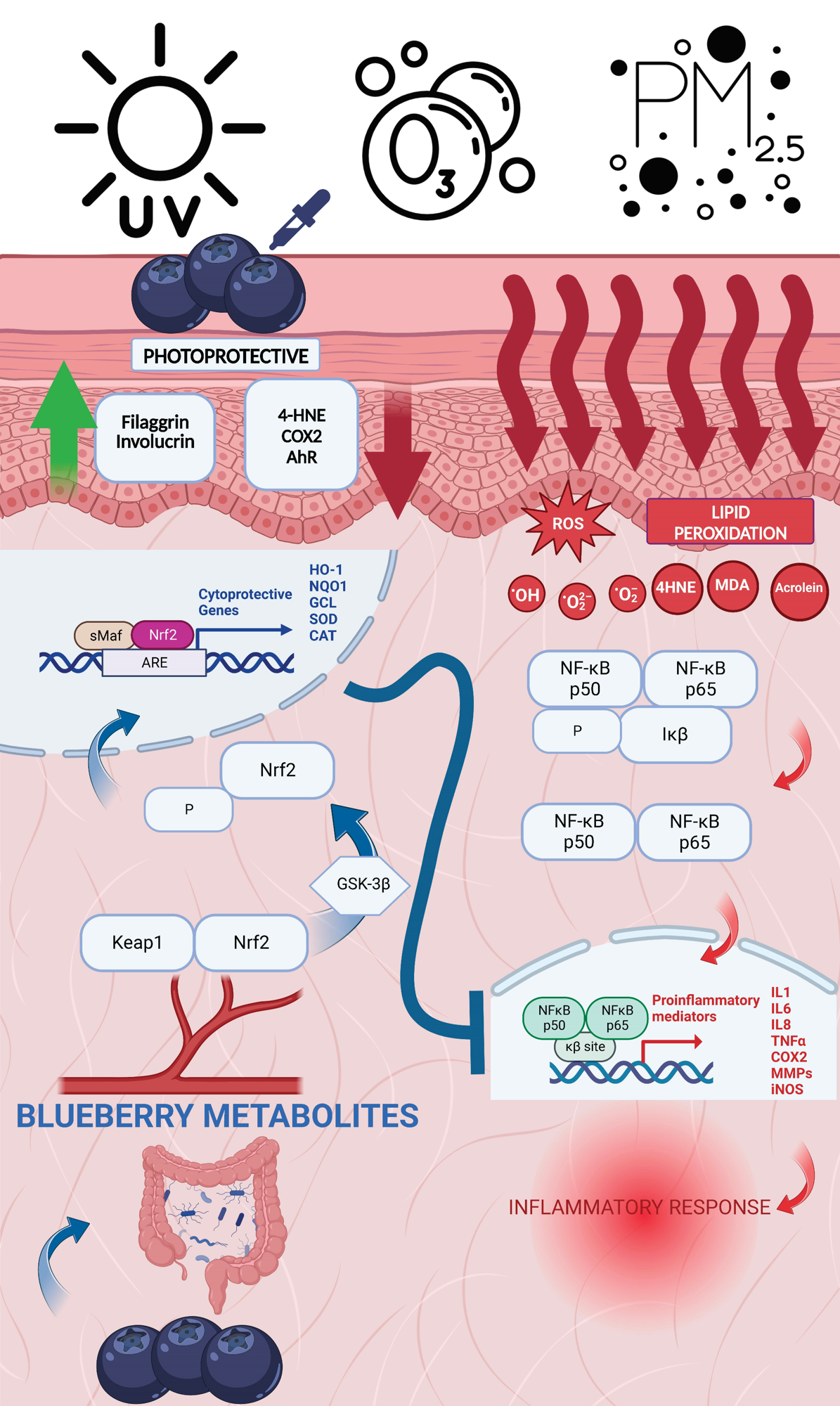Physiology of human skin
Human skin is composed of three main layers, including the epidermis, dermis, and hypodermis. The epidermis is the outermost layer of the skin and acts as the first line of defense against environmental stressors, microorganisms, and physical trauma.
The dermis, which is located directly beneath the epidermis, contains blood vessels, lymphatic vessels, nerves, and several immune cells, including fibroblasts. The hypodermis, which is also known as the subcutaneous layer, is a thick adipose tissue layer that has many important functions, including water storage, absorption of lipophilic compounds, and protection.
The cutaneous defense system consists of several enzymatic and non-enzymatic antioxidants that act in synergy to scavenge ROS, prevent lipid peroxidation, and suppress inflammation.
Catalase, superoxide dismutase, and glutathione peroxidase are the main enzymatic antioxidants that are present at higher concentrations in the epidermis than in the dermis. Non-enzymatic antioxidants mainly include vitamin C, vitamin E, glutathione, uric acid, and ubiquinol, all of which are also present at higher concentrations in the epidermis than in the dermis.

Environmental stressors
A certain level of UV light exposure to the skin is essential to produce vitamin D. However, prolonged exposure to UV light can lead to severe skin complications, including skin cancer.
Pollutants emitted from power plants, chemical plants, and cars are major sources of O3. Daily exposure to high levels of O3 can lead to cardiorespiratory complications and skin adversities.
Particulate matter (PM) is the major air pollutant produced by industrial waste products, the burning of fossil fuels, volcanoes, dust storms, and forest fires. Ultrafine PM is known to cause skin barrier dysfunction and atopic dermatitis.
The primary mechanisms involved in environmental stressor-mediated skin damage include chronic production of ROS, suppression of cellular antioxidants, induction of oxidative stress, and DNA damage.
Bioactive compounds in blueberry
Blueberries are a rich source of many bioactive compounds with antioxidant, anti-inflammatory, immunomodulatory, and antimicrobial properties, including flavonoids and other polyphenolic compounds.
Anthocyanin is the major polyphenol in blueberry, which is responsible for its blue color. This compound has strong antioxidant, anti-inflammatory, and antibacterial properties.
Other polyphenolic compounds in blueberries include flavonols, ellagitannins, proanthocyanidins, hydroxycinnamic acids, gallotannins, and hydroxybenzoic acids. Upon consuming blueberries, these compounds undergo significant modifications during metabolism, thereby leading to the generation of several polyphenolic metabolites that can be detected in the blood.
Catabolism of blueberry-derived metabolites by gut microbiota can provide protection against several health complications, including gastrointestinal problems, diabetes, cardiovascular and neurodegenerative diseases, as well as cancers.
In addition to polyphenols, blueberries are a rich source of vitamins A, C, and E, which have well-established beneficial effects on the skin.
Topical application of blueberry
Studies investigating the topical application of phytochemicals have indicated that bioactive compounds present in blueberries, such as vitamin C, vitamin E, and resveratrol, provide protection against common environmental stressors.
According to available literature, direct topical application of blueberry-derived phytonutrients and extracts reduces O3- and UV radiation-induced skin inflammation. O3-induced proliferation and migration of keratinocytes can also be prevented by blueberry extract pretreatment.
The treatment of human dermal fibroblasts by blueberry anthocyanin has been found to reduce nuclear factor kappa B (NFkB) activation and prevent collagen degradation. Blueberry extracts also appear to protect the epidermis from O3- and UV radiation-mediated damage by inhibiting inflammation and oxidative stress.
Mechanistically, blueberry extracts have been shown to modulate NFkB and nuclear factor erythroid 2-related factor 2 (Nrf2) pathways to reduce UV radiation-induced inflammation and increase antioxidant defense, respectively.
Another health benefit of topical blueberry extract application is the improvement of the skin barrier function. The UV radiation-mediated degradation of skin proteins filaggrin and involucrin is responsible for the loss of barrier function and induction of chronic skin inflammation. Blueberry topical application has been found to increase the levels of these proteins to protect against UV radiation.
The topical application of blueberry extract on the skin of female diabetic patients appears to improve skin smoothness and moisturization, as well as prevent skin wrinkle formation.
Blueberry dietary supplementation
Studies directly investigating the effect of blueberry dietary supplementation on skin health are scarce. This could be due to the low bioavailability of bioactive compounds in the blood upon ingestion of blueberries. However, there is evidence suggesting that blueberry dietary supplementation may improve skin vascular functions.
A study conducted on UVB-irradiated hairless mice has indicated that dietary supplementation with fermented black rice and blueberry with Lactobacillus plantarum improves skin hydration and barrier function.
Dietary supplementation with blueberry bioactive compounds also appears to reduce skin roughness and increase elasticity. Moreover, oral supplementation with blueberry-derived epigallocatechin-3-gallate (EGCG) prevents UV radiation-mediated loss of epidermal barrier function in hairless rats.
An imbalance in skin and gut microbiota is associated with a variety of skin complications, including atopic dermatitis, psoriasis, acne vulgaris, dandruff, and skin cancer. Skin and gut microbiota compositions are maintained through bidirectional mechanisms.
Blueberry dietary supplementation appears to increase certain gut microbial species, which might have beneficial effects in patients with psoriasis. Blueberry dietary supplementation has also been found to increase the levels of gut microbiota-derived beneficial metabolites, including short-chain fatty acids and butyrate, which might improve skin health by reducing oxidative stress and inflammation.
Journal reference:
- Ivarsson, J., Pecorelli, A., Lila, M. A., & Valacchi, G. (2023). Blueberry Supplementation and Skin Health. Antioxidants. doi:10.3390/antiox12061261